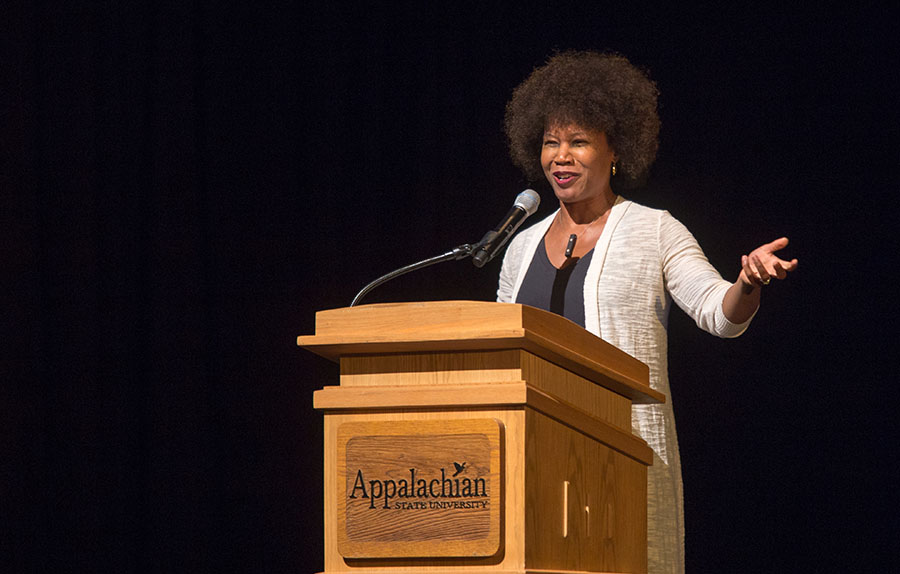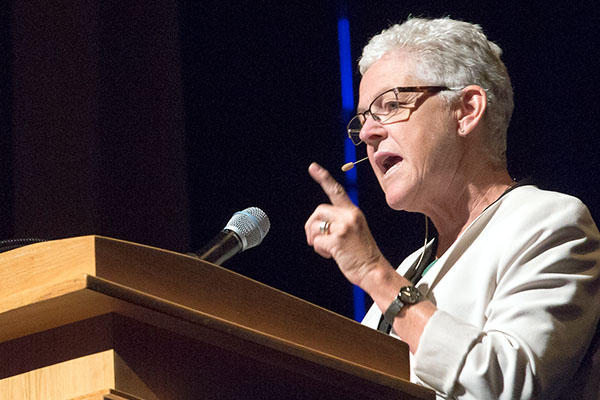BOONE, N.C.—In her address at the 2017 Appalachian Energy Summit, Majora Carter suggested her work in urban revitalization befitted a summit on energy. She spoke about the energy of people – which she called “an incredibly powerful, renewable resource.”
People energy “can be harnessed for all kinds of good, wonderful things – as long as we harness it,” she said.
Carter spoke Tuesday evening in Appalachian State University’s Schaefer Center for the Performing Arts.
Carter is an urban revitalization strategist whose ideas can also be adapted to non-urban areas. She is a MacArthur Fellow and hosts “The Promised Land,” a Peabody Award-winning public radio series.
Dr. Vachel Miller, an associate professor in the Department of Leadership and Educational Studies in the Reich College of Education, introduced Carter as a person who, “throughout her career, has built an incredible legacy as a social enterprise pioneer for sustainable communities.”
That legacy is reflective of the goals of the summit. In remarks during the three-day gathering of energy leadership from academia and industry, Chancellor Sheri N. Everts noted, “We are … focusing on the importance of inclusiveness in perspectives, policy and practice in order to further our goals of avoiding energy costs, reducing carbon use, and advancing social responsibility and environmental stewardship.”
Carter employed large-screen photos and diagrams to illustrate how much greener, livable and investment-friendly her native South Bronx has become since 2001, when she started Sustainable South Bronx. Over the next seven years, she also pioneered one of the nation’s first urban green-collar job training and placement systems and spearheaded legislation that fueled demand for those jobs. Carter now runs a consulting firm she started.
Carter’s work is based on the notion that the greatest talent an area produces does not need to flee that area to, as Carter put it, “be somebody…We have to…retain the talent that we have,” she said. “We have got to give people from our own communities reasons to stay in those communities and reinvest in them.”
Called to ‘self-gentrification’
Before entering graduate school, Carter moved into her parents’ South Bronx home to stay afloat financially. At that time, the area was infamous for high rates of crime, pollution, poverty, environmentally induced asthma and other challenges.
On a walk one day, her dog pulled her through a field of weeds and trash until they both arrived at the Bronx River. She resolved to restore it, to self-gentrify the area. In large part due to her efforts, the South Bronx improvements include:
- Park-like amenities that now make the Bronx River area worth visiting;
- Green roofs, incentivized by tax abatements, which reduce the amount of storm water runoff and also delay the time at which runoff occurs, resulting in decreased stress on sewer systems at peak flow periods;
- Care of city streets that has made them safer and more inviting of social gatherings;
- An upscale coffee house that professionals frequent;
- StartUp Box, quality assurance teams that test games and other software – and in the process increase high-tech opportunities for South Bronx residents; and
- Inclusion of the South Bronx in the East Coast Greenway, the nation’s longest connected biking and walking route.
Appalachian’s sustainability director, Dr. Lee Ball, said Carter was “unbelievably encouraging about an individual’s ability to affect change. The audience literally was buzzing after her talk.” He said one student who asked Carter how to make change in his community was visibly inspired by her words. “He walked out of there ready to make it happen,” Ball said.
About the Appalachian Energy Summit
The 2017 Appalachian Energy Summit is the sixth-annual meeting of clean energy leadership from academia and industry. The theme, “Perspectives: Policy & Practice,” highlights the multiple viewpoints needed to develop successful strategies that promote clean energy production, distribution and consumption. Appalachian assumed an active leadership role in reducing the UNC system’s energy costs by initiating the annual summit of UNC system leadership in 2012. The Appalachian Energy Summit has provided a platform through which UNC campuses together with industry partners have avoided more than $499 million dollars in utility costs, representing almost 9 billion pounds of CO2 emissions. See https://sustain.appstate.edu/initiatives/energy-summit/2017
About Appalachian State University
As a premier public institution, Appalachian State University prepares students to lead purposeful lives. App State is one of 17 campuses in the University of North Carolina System, with a national reputation for innovative teaching and opening access to a high-quality, cost-effective education. The university enrolls more than 21,000 students, has a low student-to-faculty ratio and offers more than 150 undergraduate and 80 graduate majors at its Boone and Hickory campuses and through App State Online. Learn more at https://www.appstate.edu.
What do you think?
Share your feedback on this story.




![How NCInnovation Is Rethinking Economic Development in North Carolina [faculty featured]](/_images/_posts/2026/02/rethinking-economic-development-600x400.jpg)








